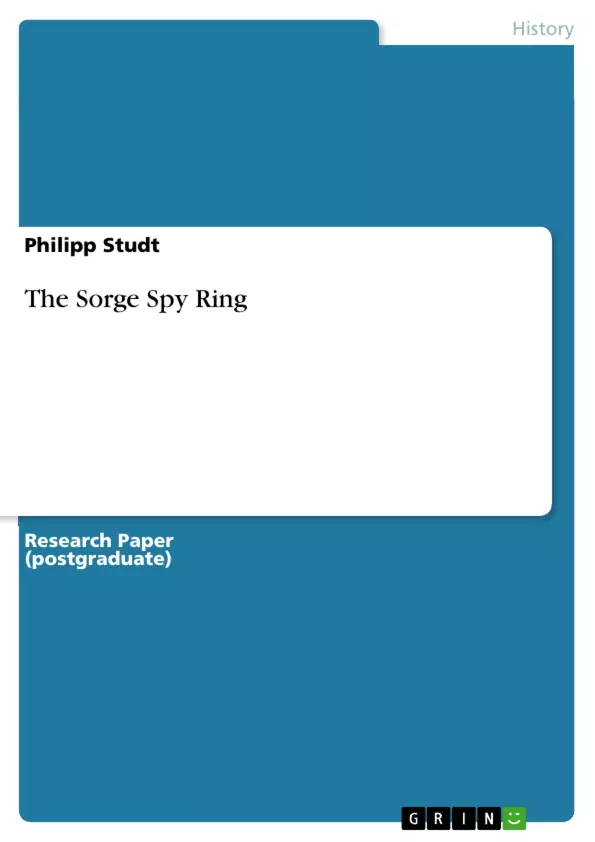Richard Sorge repeated his last words three times and, according to the Tokko’s official witness to the execution, spoke clearly and with conviction, lacking any show-off in his manner. He then snapped to attention, his executioners recognized the sure moment, and the trap was sprung. Throughout history, intelligence about adversaries has affected the outcome of conflicts. Leaders’ decisions are, amongst many other factors, at least affected by, and more often dependent on, the information that they have access to. In this paper, it will be investigated under which circumstances and to what extent spy activity affected the outcome of Russia’s defense against the German invasion during World War Two. Situations will be explored when Stalin was provided with excellent and precise information but did not use it, investigating what caused him to ignore it. Equally, the battle of Moscow will be looked at more closely to show how immensely valuable spies can be if actually listened to. This essay will focus on Dr. Richard Sorge and the members of his Tokyo Spy Ring, arguably one of the most effective groups of the Second World War, second only to Werther and the Red Orchestra. Sorge’s spy ring will be assessed in detail, aimed both to show how they were able to build up and conduct their operations in the face of considerable counterintelligence, investigating the most important members’ backgrounds to help understand their motives and convictions and finally determining what factors contributed to their identification and arrest.
Inhaltsverzeichnis (Table of Contents)
- Sakigun! (The Red Army)
- Kokusai Kyosanto! (The International Communist Party)
- Soviet Kyosanto! (The Soviet Communist Party)
- Kokusai Kyosanto! (The International Communist Party)
- Throughout history, intelligence about adversaries has affected the outcome of conflicts
- Richard Sorge was the head of a spy ring for the Soviet Union from the time he arrived in Shanghai 1930 until his arrest by the Japanese Secret Service in 1941
- Born 1895 in Baku, Azerbaijan, to a German father and Russian mother, he followed his family to Germany in 1906
- Once in Moscow, Sorge changed his membership to the Soviet Communist party and obtained Soviet citizenship, but kept his German passport and did not inform his former home country's authorities about the proceedings
- Having completed his mission, he returned to Moscow in 1933, only to be briefed on his next operation: establishing a spy network on Japanese soil with the tentative aim of gathering intelligence on Japan's future policy towards the Soviet Union
- Having already built up a friendship with Ott, who became military attaché in Tokyo in 1934, the circumstances surrounding his complete infiltration of the German embassy were bizarre
Zielsetzung und Themenschwerpunkte (Objectives and Key Themes)
This paper investigates the impact of spy activity on the outcome of Russia's defense against the German invasion during World War Two, exploring how valuable spies can be when their information is heeded. It specifically focuses on Dr. Richard Sorge and his Tokyo Spy Ring, examining their operations, motives, and eventual arrest.
- The influence of espionage on the course of World War Two
- The effectiveness of spy networks in gathering crucial intelligence
- The complexities of operating a spy ring in a hostile environment
- The motivations and convictions of spies
- Factors contributing to the identification and arrest of spies
Zusammenfassung der Kapitel (Chapter Summaries)
- The first chapter introduces the subject of espionage in warfare and the importance of intelligence gathering for leaders' decision-making. It sets the stage for the focus on Richard Sorge and his Tokyo Spy Ring.
- The second chapter details Richard Sorge's early life, his exposure to communist doctrine, and his subsequent involvement in the Comintern's Intelligence division.
- The third chapter recounts Sorge's successful establishment of a Red Army spy network in Shanghai, followed by his mission to Japan to create a new spy ring.
- The fourth chapter describes Sorge's skillful infiltration of the German Embassy in Tokyo, building trust with key figures and gaining access to valuable information.
Schlüsselwörter (Keywords)
Espionage, World War Two, Soviet Union, Japan, Richard Sorge, Tokyo Spy Ring, intelligence, counterintelligence, motives, convictions, arrest, Red Army, Comintern, Nazi, Gestapo.
Frequently Asked Questions
Who was Richard Sorge and why was his spy ring famous?
Dr. Richard Sorge was a Soviet intelligence officer who led the Tokyo Spy Ring during WWII. It is considered one of the most effective networks in history for gathering precise information on Japan and Germany.
What was Sorge's most critical intelligence contribution?
He provided vital information regarding Japan's policy towards the Soviet Union, which allowed Russia to move troops from the East to defend Moscow against the German invasion.
Why did Stalin initially ignore Sorge's warnings?
The paper investigates the factors that led Stalin to ignore excellent and precise intelligence, exploring the psychological and political reasons behind this failure.
How did Sorge manage to infiltrate the German Embassy in Tokyo?
Sorge built a close friendship with Eugen Ott, the military attaché (and later ambassador), gaining complete trust and access to high-level Nazi secrets.
What led to the arrest of the Tokyo Spy Ring?
The ring was eventually identified and arrested by the Japanese Secret Service (Tokko) in 1941 after years of operation under considerable counterintelligence pressure.
- Citar trabajo
- Philipp Studt (Autor), 2004, The Sorge Spy Ring, Múnich, GRIN Verlag, https://www.grin.com/document/53224



